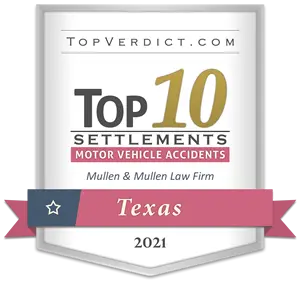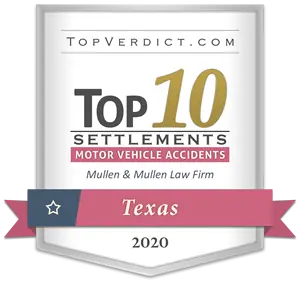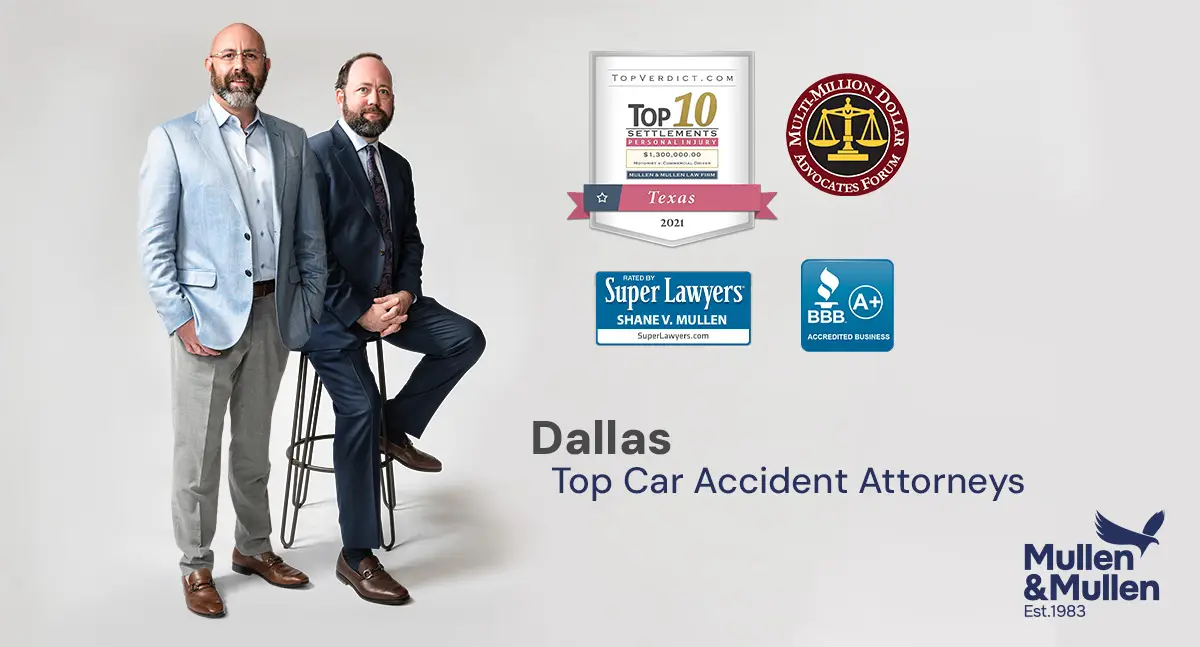Do You Really Need a Lawyer After a Car Accident?
A car accident can be a life-altering event. Don’t short-change yourself by not hiring an attorney to represent your best interests. Injured victims usually incur substantial medical expenses and are often forced to miss work while they recover from their injuries.
Even soft tissue injuries or whiplash can cause significant financial hardship. You should not be forced into debt or even potential bankruptcy because you can’t afford medical treatment.
The insurance companies don’t care about how hurt you are or the impact the car accident has had on your life. Insurance companies exist to make profits for their executives and shareholders. The job of the insurance adjuster assigned to your car accident case is to get you to accept as little as possible to release your claims against the negligent driver.
In fact, the claim adjuster’s dream scenario is that you say something they can use against you to deny your claim completely.
Retaining our counsel levels the playing field and allows you to focus completely on recovering from your injuries. The attorney fee is contingent meaning we only earn a fee if you receive compensation.
One major insurance company’s report states that claims represented by a lawyer settle for 2-3 times more than those with no legal representation. Many of our claims yield 10-15 times more.
Examples of accident claims we’ve represented that made the Texas “Top 50” personal injury settlements list, as reported by TopVerdict.com:
GROSS SETTLEMENTS LISTED BELOW BEFORE FEES AND EXPENSES
- $4,000,000.00 Wrongful death involving auto accident
- $2,978,104.95 Motor vehicle accident
- $2,550,000.00 Motor vehicle accident
- $2,550,000.00 Client needed surgery after an automobile collision
- $2,024,050.73 Client hit by a drunk driver and sustained a TBI and multiple broken bones
- $1.3 million Client hit by commercial driver who sustained a TBI
- $1 million Client hit by inattentive commercial driver
- $1 million Client hit by negligent commercial motorist
- $978,569.77 Client hit by commercial driver
- $996,292.00 Client hit by truck driver
- $960,576.60 Commercial driver hit by another commercial driver
- $954,543.87 Commercial driver hit by another commercial driver
- $925,000.00 Client hit by an inattentive motorist
- $845,000.00 Client hit by truck driver
Our role, as your attorneys, is to represent YOUR best interests.
We assist motor vehicle accident injury victims in navigating the legal process and help them to pursue their legal rights. Here are some ways in which we will assist you:
As dedicated advocates, we are committed to:
- Assisting you in obtaining loans for financial relief, should you require them.
- Ensuring that you receive the medical treatment you need and deserve without any upfront costs.
- Offering a discounted contingent attorney fee of 29% of the gross recovery for claims that do not require litigation, compared to the industry standard fee of 33.3%.
- Providing in-house accident investigators at no additional cost to you. While many firms hire investigators and pass on the costs to clients, we have dedicated investigators on our team and offer their services without any charges. This approach allows us to maximize your compensation even further.
Other things we do include:
Investigating the accident
Our accident investigators will conduct a thorough investigation of the accident to determine who was at fault if necessary. They gather evidence, such as witness statements, police reports, and photographs of the accident scene, to build a strong case on your behalf.
Evaluating damages
Your lawyer will help you understand the full extent of your injuries and the potential costs associated with your specific injuries. We will work with medical experts to evaluate the long-term impact of your injuries and ensure that you receive compensation for all losses including medical bills, lost wages, pain and suffering, mental anguish, impairment, and all other non-economic damages you are entitled to.
Negotiating with insurance companies
Our top car accident lawyers in Dallas are skilled negotiators and will go toe-to-toe with the insurance company to obtain a fair settlement for your injuries and losses. We can help you navigate the complex insurance claims process and ensure that you receive the compensation you deserve.
Representing you in court
If necessary, our attorneys can represent you in court to ensure that your legal rights are protected. We will present evidence, cross-examine witnesses, and make persuasive arguments on your behalf.
Providing support and guidance
Your lawyer can provide you with the support and guidance you need during this difficult time. We will answer your questions, provide legal advice, and ensure that your case is handled with care and compassion.
Our attorneys are an invaluable asset if you have been involved in a car accident. We will help you understand your legal rights, pursue the compensation you deserve, and provide you with the support and guidance you need during this challenging time.
The biggest mistake you can make is handling your accident claim on your own.
Yes, we are going to get part of your compensation, but even so, we will put way more money in your pocket than you could ever hope to negotiate on your own. We work hard on your behalf to earn our cut and pay for ourselves. At Mullen & Mullen, we pride ourselves on achieving as many full policy limits settlements as possible.
Settle for more with Mullen & Mullen. Call (214) 747-5240 to get your free, no-obligation consultation today!
General Overview of Motor Vehicle Collisions
A car accident occurs when one or more vehicles collide with each other or with a stationary object, such as a tree or building. They can be devastating and cause significant injuries to drivers, passengers, and pedestrians. Collisions can be caused by a wide range of factors, including driver error, vehicle malfunctions, road conditions, and weather.
Some of the most common types of MVAs that can occur include:
Rear-end collisions
These occur when a driver hits the vehicle in front of them.
Head-on collisions
These occur when two vehicles collide with each other from opposite directions. This type of collision has an impact double your driving speed. So, if you’re going 45 mph, you experience the consequences of a 90-mph accident. Drunk driving, distracted driving, drowsy driving, and unsafe passing frequently cause head-on collisions. Fatalities often result because the driver doesn’t have time to react. Drunk or fatigued drivers, for example, don’t swerve or brake. Spinal cord injuries, permanent paralysis, broken bones, soft tissue injuries, traumatic brain injuries, loss of limbs, and knee, hip, and leg injuries result.
Side-impact collisions
Also known as T-bone accidents, these occur when a vehicle is hit from the side by another vehicle. This type of accident usually results from someone merging into another’s lane, running a red light, or making a driving error at an intersection and frequently causes serious injuries. Head, neck, chest, pelvis, abdomen, and limb injuries can result. Traumatic brain injuries can happen. Fatalities are also common.
Rollover accidents
These occur when a vehicle flips over onto its side or roof. Rollovers happen and don’t necessarily need to involve another driver. Something as simple as a pothole can be enough to cause you to lose control and roll your car. Another car running into you may cause you to swerve to dodge them and roll over your vehicle. You can suffer any type of injury, ranging from none to a broken spine or fatality.
Single-vehicle accidents
These occur when a vehicle crashes into a stationary object or goes off the road.
Multi-vehicle accidents
These occur when multiple vehicles are involved in an accident. While rare, you hear about these on the news because they’re so exceptional and they make for an attention-getting news story. They happen because of speeding, tailgating, distracted driving, drunk driving, failure to yield, road rage, negligent entrustment, and reckless driving. This type of accident is particularly deadly because of the entire mass of crumpled vehicles. This makes escape difficult. And if victims do escape, sometimes they get hit by more vehicles entering the pileup. A single car, for example, may get crushed by several collisions. Many fatalities and all the severe injuries you’ve read about in other accidents can happen in multi-car pileups.
Hit and runs
Texas law requires you to stop and render aid if you find yourself involved in a car accident. Some motorists fear the consequences of their actions so much that they simply leave the scene and hope to never be caught. Maybe they don’t want to be arrested, can’t afford having their insurance rates going up, or maybe they just panicked. Hit-and-run accidents can have simply minor damage and may not cause you any physical or emotional harm. But they can also be quite severe and may result in injuries that take weeks or months to heal from. And they can result in fatalities too.
Common Types of Injuries Sustained in Car Accidents
In the experience of our attorneys, spinal injuries are exceedingly common in motor vehicle wrecks. These injuries can be soft tissue in nature or more substantial, such as a herniated disc and/or extruded disc. Symptoms such as numbness, tingling, shooting pains, or weakness can indicate a possible herniated or extruded disc.
Of course, wrecks can also directly lead to broken bones, fractures, and muscle tears.
Here are some of the common injuries sustained in motor vehicle collisions:
Theories of Liability in Car Accident Cases
Our lawyers will carefully analyze your case and determine the proper theory or theories of liability to assert in support of your injury claims. The most common theories of liability are:
Negligence
The vast majority of car accidents occur due to the negligence of one of the drivers involved in the wreck. Our attorneys will argue that the at-fault motorist failed to meet the standard of reasonable care. All motorists are expected to behave as a reasonable driver would behave under like and similar circumstances. For example, a driver who is texting, inattentive, and fails to yield the right-of-way would not be exercising the duty of reasonable care.
The insurance adjuster could attempt to argue that you were comparatively negligent for causing the wreck. In other words, they could attempt to argue you were partially at fault – even if the police report is 100% in your favor. They could argue you had the last clear chance to avoid the accident and weren’t paying attention either. It’s important to remember that you are entitled to damages if you are 50% or less responsible for the accident. The damages awarded, however, would be reduced by your percentage of fault.
Manufacturer Liability
This theory can be asserted if a defect in either vehicle involved in the wreck caused the accident. This type of case require extensive use of experts and is usually only asserted when an injured party has suffered debilitating injuries or the accident results in the loss of life. Seatbelts, airbags, accelerators, brakes, and engines are the most common defective parts.
Road Design
This theory can be asserted in cases such as a defective traffic signal, missing signage, unsafe guardrails, or special defects in the roadway. Most of these cases involve government entities and require that prompt notice of claims be filed with the applicable city, county, government agency, etc. In fact, sometimes the notice of claim must be asserted within 30 days of the motor vehicle accident.
Wrongful Death
If your loved one was killed in a car wreck due to the negligence or recklessness of another driver you can pursue a wrongful death lawsuit. It is important to examine what family members have claims and to work with an attorney who can properly decide whether wrongful death or survivorship claims should be emphasized.
Respondeat Superior
Texas recognizes the doctrine of Respondeat Superior. Employers are responsible for the negligent acts of their employee while the employee is in the course and scope of employment. For example, if you were involved in a car accident with an XYZ Construction vehicle, the employee operating the vehicle and XYZ Construction would both be proper Defendants and liable for your damages.
Negligent Entrustment
If the owner of a motor vehicle entrusts the vehicle to an unlicensed or incompetent driver the owner may be held liable for your injuries under the theory of negligent entrustment.
Damages You May Be Entitled To in a Car Accident
Texas law allows you to be compensated for “economic” and “non-economic” damages. To start, learn about the economic damages you can recover when someone else is at fault for the injuries you sustained in your car accident:
Medical Expenses
The other driver is responsible for the reasonable and necessary medical expenses you incur as a result of their negligent behavior. This includes therapy sessions, adjustments, massage, medical devices, consultations with doctors, any necessary imaging (CTs and MRIs), pain management, surgery, or any other medically necessary services. Insurance companies often try to argue at least some of your medical expenses were “unreasonable” or “unnecessary.” They pay doctors to come up with elaborate explanations as to why. They may also try to say you have a “pre-existing” condition.
Future Medical Expenses
You can recover the cost of any future medical care you will require over the course of your lifetime;
Lost Wages
Based on the severity of your injuries, you’ll lose a certain amount of time at work. You can recover compensation for all that lost time.
Loss of Earning Capacity
The car accident may leave you unable to perform your work to the full extent you did prior to the wreck. For example, if you were a warehouse worker making good money and your injuries left you unable to lift 20 pounds you would have to transition to a new sedentary career – a desk job. If you had no prior experience in an office environment the new position would likely be at a significantly reduced salary. You are allowed to seek the difference in those earnings over the course of your lifetime as damages.
Non-Economic Damages
Non-economic damages are more subjective in nature and are designed to compensate you for the impact the car accident has had on your life. These damages include:
Pain and Suffering
This compensation applies to the physical pain and suffering you receive from your injuries following your accident. You can seek damages for pain and suffering you experienced in the past as well as for pain and suffering you will continue to experience in the future. The severity of your injuries will be the prime consideration.
Mental Anguish
This covers things like fright, worry, grief, self-pity, and any other mental suffering you experience as a result of your accident. Car accident victims often experience emotional pain and emotional trauma following a serious accident. You can seek damages for mental anguish in the past as well as future.
Physical Impairment
This compensation applies to physical limitations caused by the accident. For example, if a car accident left you physically unable to bend or stoop as you once could. Another example would be walking with a limp. You are entitled to recover for both past physical impairment and future physical impairment. It is usually wise to get an Impairment Rating from a doctor when you have concluded your treatment.
Loss of Consortium
If your loved one was harmed or killed in the accident, this compensation covers the loss in relationship you experience. The feeling of companionship, sexual relations, affection, and comfort can be compensated.
Punitive Damages
These damages punish the at-fault party or parties for their behavior. Generally, their actions must be malicious and egregious to the point where it makes sense to punish them severely so that they don’t engage in the behavior again. These damages are difficult to obtain but can usually be recovered in cases where the at-fault driver was drunk or under the influence of drugs. In DWI/DUI cases the at-fault driver’s actions are usually determined to have been reckless – not just negligent.
Different Types of Car Accident Claims
You may have several potential claims to set-up following your auto accident injury. You may be unaware of some sources of potential recovery following your loss. Listed below are a few of the insurance claims that may be available to you:
- Liability claim against the at-fault driver for negligently or recklessly operating a motor vehicle;
- Liability claim against the at-fault driver’s employer if the driver was in the course and scope of his or her employment at the time of the motor vehicle accident;
- Liability claim against the owner of the at-fault motor vehicle if the owner negligently entrusted it to an unlicensed or incompetent driver;
- Property damage claim for the amount of money needed to repair or replace your vehicle;
- Diminished value claim for the loss of value your vehicle sustains following a motor vehicle accident;
- Uninsured motorist claim through your car insurance carrier if the at-fault driver did not carry liability insurance coverage as required by law;
- Underinsured motorist claim through your own car insurance carrier if your injury damages or property damages will potentially exceed the at-fault driver’s insurance limits;
- Personal Injury Protection (“PIP”) / No Fault benefits through your own car insurance carrier for reimbursement of medical expenses and lost wages associated with your automobile accident; and
- MedPay / No Fault benefits through your own car insurance carrier to cover medical expenses incurred (subject to repayment if you obtain third-party funds).
- Underinsured motorist coverage (UIM) is first-party insurance meant to compensate car wreck victims if the at-fault driver or at-fault drivers did not carry sufficient liability limits. Like Personal Injury Protection benefits, you may be entitled to coverage if someone in your household has underinsured motorist coverage on their automobile policy.
It is exceedingly important that you obtain permission from your own insurance carrier to settle with the at-fault driver’s insurance carrier prior to accepting any offer the liability carrier makes. A failure to do so could result in you not being eligible for underinsured motorist proceeds.
Your car insurance company owes you a duty of good faith and fair dealing. If you present an underinsured motorist coverage claim and your insurance carrier denies it you may be entitled to file a lawsuit for bad faith insurance practices.
Uninsured motorist coverage (UM) is important if the person that collided with your vehicle did not have insurance or if you were involved in a “hit-and-run”.
It is important to remember that uninsured motorist coverage is only applicable if the at-fault driver made actual physical contact with your automobile. You are also able to file a bad faith lawsuit if your insurance company unreasonably denies your claim.
What You Need to Know About Insurance Companies
No matter how much they might advertise it, insurers are 100% not “on your side.” In reality, they spend the second most amount of money lobbying Congress and the Senate to write laws in their favor (right behind the healthcare industry). In 2021, for example, they spent $111 million doing so.
It’s no different right here in Texas. Remember that insurers spend a lot of time and money trying to get the rules of the game in their favor. How they treat injured victims is not right, so they try to make it legal! With that in mind, here’s what to know when interacting with insurance companies:
They record your calls to use what you say against you later on.
Yes, the recorded voice message says “Your call is being recorded for ‘quality assurance.” That might be partially true. But it’s also true that anything you say can and will be used against you.
Remember, insurers exist to make a profit. They have investors to report to. If they give those investors an unprofitable report, their stock price goes down. That could represent hundreds of millions of lost dollars.
This could lead to the CEO and upper-level executives losing their jobs. They obviously don’t want that to happen, so they create a system to delay, deny, and minimize claims.
Never relax when talking with adjusters.
Adjusters know that if they bully or intimidate you, it’s obvious what they’re up to. They know a more effective tactic is to appear super nice and honest, as though they’d never even hurt a fly.
Don’t be deceived! They know that if they can convince you that they’re really here to help, you’re more likely to let your guard down and start sharing information that hurts your claim. Suddenly, later on, they say they’re going to pay you less (or nothing at all) because you told them this, that, and the other thing. Don’t be their next victim!
Never sign anything fast, or without showing it to a car accident lawyer.
Wow! The insurance company overnights you forms so you can sign them and get your check in just a few days. You’ve never seen them act so fast. Why is it that they’re acting so quickly now, but when it comes to paying at any other time, they take as long as possible?
They’re trying to get you caught up in the excitement of getting paid fast so you don’t investigate how much you should really get paid.
However, nothing in Texas law obligates you to take their offer or to respond quickly to it. You have two full years from the date of your accident to file a lawsuit if necessary. So, even if you’re pretty sure you have an offer you like, it’s worth your time to run the offer and associated paperwork by a lawyer.
The worst thing that happens is that you learn you have a good offer and should accept it. Conversely, you may find out you should actually receive much more than what the insurance company is offering.
How Does the Insurance Claims Process Work?
After a car accident, your first step is to file a claim with the at-fault party’s insurer. They’ll ask you for proof regarding the severity of your injuries and the medical treatment you have retrieved so far.
Once they get that information from you, the insurer does their own investigation. They’ll ask you for further information regarding your accident. They’ll ask for:
- Photos of the accident
- The police report
- Witness contact information
They may also ask you to see a doctor of their choosing. And you can guess what they’re looking for. Though called “independent medical examiners,” their examinations are anything but independent.
Because these doctors make a lot of money due to the sheer number of patients insurers refer to them, they tend to make findings that favor the insurers. And of course, the more findings a doctor makes in their favor, the more business the insurer sends their way.
There’s not necessarily a written agreement. It’s an unwritten understanding. And you can bet insurance companies know exactly which doctors help them out most.
Texas law does not require you to see the insurer’s doctor. So don’t feel any pressure to do so if the insurer asks you. You can see your regular family doctor or any one of your own choosing.
Insurers can require you to see their doctor after you file a lawsuit. However, they must show “good cause.” And your attorney can place restrictions on what type of doctor you see and how they conduct their exam.
Once the insurance company has done all the investigation, they feel necessary, they’ll come back at you with an offer. You have three choices at that point:
- Accept the offer
- Make a counteroffer
- Talk to a car accident lawyer to ensure you have a fair offer
Insurer Not Treating You Fairly? Call (214) 747-5240 to Get Your Free, No-Obligation Consultation Today!
How Do Money and Compensation Work?
You need a certain amount of money to maintain your quality of life. And the at-fault driver should have to compensate you for that. Because, if they had been driving responsibly in the first place, you wouldn’t have the injuries, pain, suffering, and loss of quality of life that you do.
How Much Can You Expect to Recover?
Make no mistake about it: much of this depends on the skill and personal concern of your lawyer. While you can interview dozens of car accident lawyers in the Dallas area, they generally fall into three categories:
Settlement mills
These law firms are all over your television and seem to have billboards everywhere they can find. They have fast, catchy advertisements. And they sell stories of clients who win big chunks of cash. They seem convincing.
But the problem is volume firms have an incentive to ram cases as quickly as possible through the settlement and legal process so they can quickly cover their huge monthly marketing budget and overhead. Your case may not get the individual attention it needs and deserves to ensure you receive the compensation you deserve.
Do some of these car accident victims get big settlements? Yes. However, the typical person likely gets less than they should, and a lot of these firms use high pressure to get you to “act now”.
Large, impersonal firms
These firms aren’t as focused on processing your claim as fast as possible. But the nature of their process still puts you at risk. They’ll have you meet with an experienced senior attorney before handing off all the real work to an inexperienced junior attorney and paralegals. A junior attorney may even do the arguing in court, if it becomes necessary. Make sure to ask the lawyer who does all the real work on your claim and see how they answer your question.
Small firms focused on personal relationships
These firms have just a few lawyers and a small team supporting them. Rather than focus on volume, these firms take on a limited number of cases. That means your case gets the specialized time and attention it deserves. Ultimately, that leads to you having the best chance possible of recovering the most compensation for your injuries.
In addition to the skill of your lawyer, you can recover compensation for economic damages associated with the loss including:
- All past, present, and future lost income (lost earning capacity)
- Medical bills in the past, present, and future
- In-home care costs
- Damage to your vehicle
- Diminished value of your vehicle
You are also entitled to compensation for non-economic damages some of which include:
- Mental anguish (past and future)
- Physical impairment (past and future)
- Pain & Suffering (past and future)
- Disfigurement
- Punitive damages
- Loss of household services performed by the injured party
- Loss of companionship
This not an exhaustive list and your attorney should carefully review your case to ascertain all available damages under the facts and circumstances of your case.
How Do Insurers Determine What They’ll Pay You?
Obviously, this is a heavily biased process. As you’ve learned, insurers pay an army of lobbyists to get laws written in their favor in the first place. That gives them the basis for paying you less than what’s right. And, of course, they’ll do everything in their power to minimize what they should pay you, hoping they can even get away without paying you anything at all.
Insurance carriers routinely pay third-party companies to audit medical bills or audit the bills themselves. Spoiler: No matter what your medical bills are the carrier – or the third-party company that gets the majority of their business (if not all) from the carrier – will say they are too high. Further, they will argue that at least some of the treatment (if not all of it) you received was not reasonable or necessary.
Carriers will usually only consider lost wage damages if you have a letter from your treating provider specifically indicating that you cannot work and why.
Once they have reduced your economic damages as low as possible, the carrier usually offers some amount of “general damages” based off some proprietary computer software heavily influenced by billing or diagnostic codes. Spoiler: They will use a robot to insulate the adjuster from having human emotion towards you in arriving at damages for pain, suffering, mental anguish, impairment, etc. They want you to just be a number. Simply words on paper. Pretty wild, right?”
Defenses Insurers Might Use to Reduce Your Claim’s Value
The largest insurance companies are worth billions. And they don’t get there by writing checks. They work hard on writing the rules of the game by lobbying lawmakers at the state and national levels. And short of that, they’ll push you around as much as they can, so they pay as little as possible.
These are the common defenses they’ll use to reduce what they owe you:
You had some fault for your injuries.
Texas follows the “comparative negligence” rule. That means you can be held partially at fault for your injuries. And, if you are more than 50% responsible for your injuries, you don’t get any compensation at all.
So, for example, if you are found to be 25% of the reason you were in a car accident, then your compensation is reduced 25%. If this is the case, then you can’t do much about it. However, as you might expect, insurers may try to say you had partial fault when in fact you had none.
Some other party was responsible.
Insurers will try to place some or all the fault on someone other than their driver. This could be another driver. It could be the manufacturer of an auto part they claim to be defective. Or it could be a government entity who they claim didn’t maintain the street properly. They’ll check every possibility to try to dodge payment.
You had a pre-existing condition.
The insurer may also try to say that the car accident didn’t cause your injuries. In fact, they claim, you have a pre-existing condition. You can’t recover compensation for a pre-existing condition. However, if the car accident exacerbated your injuries, you can get compensation for the extent to which it did so.
You failed to minimize damages.
Legally, this is called “failure to mitigate damages.” The insurer may try to show that you failed to take actions that would have led to the least losses possible.
For example, you failed to see a doctor at all. And if you would have, your injuries would not be as severe as they are. As a result, the insurer shouldn’t have to pay you for how much you made your injuries worse.
Expired statute of limitations.
In Texas, you have two years from the date of your accident to file your lawsuit. If you fail to do so, you cannot pursue that claim ever again. Even if you’re in the middle of the negotiations process, this could pass and come in as a viable defense for the insurer.
You experienced minimal property damage.
Insurers may look at the extent of the damages to your vehicle and then claim that there’s no way the accident could have caused the injuries you’re experiencing. We can come back with the counterargument that your body, not the vehicle, absorbs most of the damage in an accident.
Gaps in medical treatment.
This one has become especially popular because of COVID-19 making consistent medical treatment more difficult to get. However, we can easily counter it by saying that you were trying to “tough it out.”
Intentionally misleading questions.
The insurance company’s claims adjuster asks questions with the intent of gleaning information to use against you. They may ask questions with no “right” answer. They may also ask questions in intentionally confusing or misleading ways.
Insurer Making You an Unfair Offer? Call (214) 747-5240 to Get Your Free, No-Obligation Consultation Today!
What if You Had an Accident with an Uninsured or Underinsured Motorist?
If you’re involved in an accident with one of the 4 million uninsured vehicles in Texas, or one of the many underinsured motorists, you don’t have to panic. More than likely, you have insurance coverage for this situation. Texas law does allow you to sign a waiver saying you don’t want this type of coverage. But few people do that (for obvious reasons).
In some cases, the uninsured driver will have enough personal assets to cover the damages they caused. Sometimes, they simply forget to renew their auto insurance.
But in most situations, the uninsured driver has such little money available that they can’t afford their car insurance. And even if you were to win a lawsuit against them, they’d never pay. So, the best thing you can do is file a claim with your own insurance company because they offer some uninsured motorist coverage.
However, your insurance company doesn’t want to pay any more than they have to either. And so, they’ll put you through all the same difficulties the at-fault driver’s insurer would.
This is where an experienced car accident attorney becomes valuable. One can help you uncover the financial situation of the other driver. And they can help you figure out how to navigate the situation should they not have the money necessary to compensate you for your injuries.
How Long Does it Take to Get a Settlement Offer?
Many car accident claims can be resolved within a few months. However, the specific facts surrounding your situation affect just how long it will take to recover financial damages.
Those include:
Your injuries
It’s wisest to wait until you have reached a point of “maximum medical improvement” before accepting a settlement. This is the point where your doctor says your injuries will not improve further.
The reason to wait this long is because it’s important to know the full value of your medical expenses, as well as the potential value of your future medical expenses. Otherwise, you could be trapped in a situation where you have high medical expenses you can’t pay.
The insurer
Different insurance companies negotiate your claim in varying ways. This can be longer or shorter, depending on the company.
If you have a lawyer
If the insurer knows you don’t have a lawyer, they may wait if they can to make an offer. They do this because they know that more than likely you have rising expenses you can’t pay. This slowly puts more pressure on you to accept whatever offer they make, even if it’s way lower than what you should get. Therefore, it makes sense to involve a lawyer as fast as you possibly can.
Recover Fair Compensation! Call (214) 747-5240 to Get Your Free, No-Obligation Consultation Today
What About Car Accidents Involving City or Government Officials?
Do legal processes and rules change when you get in an accident with a city, county, school, or government vehicle?
They do. And unfortunately, things become a little more difficult. It is imperative that you provide “Notice of Claim” exactly in the manner prescribed by the state / county / city within the applicable time period. This time period is typically 6 months but some municipalities provide for as little as 90 days. Contact an attorney as soon as possible in one of these situations. If you fail to proceed correctly your claim could forever be barred.
In addition, claims against these entities involve various caps on damages.
This sounds unfair, but it is the way that it is. When our nation was first formed, it adopted England’s policy of “sovereign immunity.” At its most basic level, this means that a land’s ruler cannot be sued. In 1969, the Texas Tort Claims act was passed to allow lawsuits for accidents involving government vehicles or ones which happen on government land.”
Common Myths & Misunderstandings About Accident Claims
You probably understand that law doesn’t always work the way you think. That’s one of the reasons why you’re looking for a lawyer representing you. That’s a wise move on your part. Here are some things that many of our clients commonly misunderstand when first approaching us about their claim:
The at-fault party doesn’t necessarily owe you money for all your medical care.
Texas law says someone owes you for “reasonable” medical bills and healthcare. And of course, insurance companies work hard to use this to their advantage.
You’ll need to spend a lot of time in court.
More than likely, you’ll never set foot in court. That’s because Mullen & Mullen settles most claims without having to file a lawsuit. In the rare event you do have to go to court, skilled litigators do most of the talking. If you do have to testify, your counsel will make sure you are fully prepped beforehand to best respond to questions.
You’re wasting your time talking to a lawyer if you have minor injuries.
Some car accident injuries don’t show their full effects for days or weeks. Whiplash and traumatic brain injuries, for example, can fall into this category.
Even if you have seemingly minor injuries, you’re wise to talk to a lawyer. The worst you’ll find out is that you do in fact have just minor injuries and won’t need to proceed with action against the at-fault party’s insurer. But you could also find out that you should get much more compensation than you initially thought.
You’re greedy or filing a frivolous lawsuit.
The news media love to only bring forth the most sensational legal stories because they garner the most attention. And so, when it comes to legal claims, you frequently only hear about completely ridiculous cases.
This then leads many accident victims to believe that all legal claims are based on greed or frivolity. While a tiny fraction of cases are insane, the vast majority simply seek fair compensation for injuries and damages caused by another party. If someone else’s negligence causes you harm, why shouldn’t they take responsibility and pay for it? It’s only fair that you get compensation for someone else’s poor choices.
Your claim will take years to resolve.
It’s true that some claims get that complicated. However, many resolve within just a few months. It really depends on the facts surrounding your claim and the evidence the insurer thinks they must dispute the amount of compensation you’re seeking.
Insurers won’t pay.
It’s true that insurers don’t like to pay. And they don’t want to pay any more than they have to. But they still must pay. And a big factor in what they end up paying lies in the skill and experience of your lawyer.
The other party doesn’t have enough money to pay.
In most cases, at-fault parties do not have the cash available to pay. But that’s why they carry insurance, which does have the money to pay. It’s rare, but it does happen when the other party doesn’t have the cash or the insurance in place to pay. However, that’s where your uninsured / underinsured motorist coverage applies.
You shouldn’t file a claim against a family member or friend.
No one wants to put intense strain on a close relationship. But, if you’re injured and have costs, who should have to pay for your injuries? A lawyer can make dealing with the issue a lot less stressful for you because they can take care of all the communication.
You should wait until your injuries heal before filing a claim.
This is about the worst thing you can do if you want to recover full compensation. Evidence can be lost or destroyed. The insurer can question how injured you really are or the true source of your injuries. It’s always wisest to talk to a car accident lawyer in Dallas as soon as you possibly can.
The insurer has already agreed to pay. You don’t need a lawyer.
Insurers will happily agree to pay quickly as a strategy for not paying any more than they must. For example, they know you may also be entitled to payment for co-pays, out of pocket expenses, lost wages, loss of earning capacity, pain and suffering, mental anguish, and more. It’s true. You may not need a lawyer. But you’re wise to at least run your situation by one so that you know you’re compensated.
Can’t I just take my claim on by myself?
In rare situations, you can. In most situations, it will be more beneficial to let a lawyer handle your case. For example, our lawyers recover on average 10-15 times more than what you would get on your own.
What if I already settled my claim with the insurer and suddenly realize I have more medical expenses I can’t afford?
Unfortunately, more than likely, nothing can be done at this point. When negotiating with the insurer, you likely signed a form that waived your rights to any further action or compensation.
I’m too busy. Can I wait to file my claim?
While technically you can, it’s not in your best interest. The longer you wait, the more evidence that becomes lost or destroyed.
Insurers can use any delays in action against you to question the true extent of your injuries.
You also run the risk of running past the statute of limitations. This gives you two years from the date of your accident to file your claim. If you wait longer than that, you can no longer pursue compensation for your injuries.
Life will never be calm enough such that it feels like the right time to file your claim. And besides, our legal team does most of the real work for you so you can focus on your life and recovering from your injuries. Don’t trick yourself into never getting compensation for your injuries.
I already got an offer from the insurance company. I don’t need a lawyer.
Why is it that insurers suddenly can rapidly figure out how much money to pay you when they usually make payments of any kind as difficult and lengthy as possible?
They want to sucker you into taking a much lower amount than you would get if you hired a lawyer. There’s a small chance you did get a fair offer. But more than likely, it’s much less than you could get.
And it may not even cover the expenses that result from your accident. At least run your offer by a lawyer. The worst you can find out is that the offer is fair and that you should accept it.
If you have insurance, you don’t need a personal injury lawyer.
Make no mistake about it, your insurer doesn’t want to pay more than the at-fault party’s insurer. Let’s say the at-fault driver doesn’t have any insurance at all. Then you must file a claim under your own insurer’s uninsured / underinsured driver policy.
Just because you pay for that protection doesn’t mean that it covers what you think. You may still need a lawyer to get fair compensation from your own insurance company.
Holding out will get you a larger settlement.
Sometimes, this might be the case. Others, it may not be the situation at all. If you’re handling your own claim, understand that insurers may not even care if you hold out.
They may be leveraging your actions against you. They know that more than likely you don’t have the money to cover your injuries and financial damages. And so, they know pressure is mounting for you to take their offer, even if it’s unfairly low. Holding out may backfire on you. You’re always wise to at least run your claim by a personal injury lawyer. The worst thing that happens is that they tell you the insurer is being fair and to accept their offer.
The courts are too busy, and it will take too long to file your claim.
While it’s true the legal process is usually not a fast one, it’s certainly not true that courts are too busy to even hear your case. And for starters, because of our proven experience, only 10% of our cases even have a possibility of going to court.
And in many situations, a lawsuit is filed, but still settles before going to court. Remember that, while courts are busy, they exist to provide justice and resolve legitimate disputes. While you may not get your claim resolved in the time you hope, you’re still wise to hire an attorney willing to take your claim to court. Sometimes, it’s the only way to get fair compensation.
Lawyer’s fees will eat up most of your settlement.
It’s true that lawyers charge money for their services but good firms will increase the value of your case so that you personally do better even after paying an attorney fee. Mullen & Mullen guarantees no matter the amount of your medical bills, you will receive money in your pocket, or we’ll completely waive our attorney fees.
Most attorneys offer a free consultation. They’ll review your case and advise you of your legal options. If the attorney fees might eat up most of the money you would recover, ethical lawyers will advise you of that up-front.
Request Your Free Consultation Now
Everything You Need to Know about Police Reports
While police reports can be a critical piece of evidence in proving your car accident claim, they don’t guarantee victory. In fact, a police report can be completely disallowed by a judge so the jury never even sees it. To be admissible in court, a police report must be proven to be factually correct. If it contains errors, it will likely be thrown out.
Regardless, we will still get a copy of your police report because more often than not, it is the single most important piece of evidence. To this end, it is extremely important that you call the police after your accident so that they come to the scene and fill out their report.
If they don’t come, for whatever reason, make sure you document all the evidence (as noted earlier) and fill out your own police report at your local precinct. In the City of Dallas, you can do that at this link. In other jurisdictions, contact your local police department for instructions.
Without a police report, the insurance company will have more power to give you an absurdly low settlement offer. And they may even be able to get away with not offering you anything at all.
What Information Does Your Police Report Need to Contain?
If you have to file your own police report, you’ll want to make it as thorough as possible. Most police reports, and yours, should include the following information:
- Date, time, and location of your accident
- Name, address, and insurance information for all parties involved
- Any citations issued
- Identifying information for all witnesses
- The officer’s opinion as to who was at fault
Dallas Accident Resources
- Dallas Police Department Open Records Unit
- Dallas County Sheriff’s Department Records
- City of Dallas Records
- Dallas Police Department Auto Pound
- Texas Department of Insurance
- Texas Department of Transportation
- Texas Constitution and Statues
- Kelly Blue Book Online
- Insurance Institute for Highway Safety
- National Highway Traffic Safety Administration
- Resource for all the latest recalls and driving safety information
- Website link
Common Causes of Car Accidents in Dallas
Dallas has the second highest traffic fatality rate among all cities not just in Texas, but in the entire United States, according to research from the National Highway Traffic Safety Administration. Make no mistake about it, Dallas is not a safe place to drive.
Car accidents happen for many reasons. These are the leading causes and the law that surrounds them:
Speeding
Speed limit signs are posted for a reason. The higher your speed, the more likely you are to be in an accident and the more severe the damage. The closer you drive to the speed limit, the safer you are.
Texas law does not define at what speed you can be charged with reckless driving. However, generally if you go 20 mph over the posted speed limit, you face a high likelihood of this charge.
Distracted driving
Drivers become distracted for many reasons: eating, talking on their phone, talking to passengers, or putting on makeup. Texting while driving has become so common that it actually frequently gets a separate classification from distracted driving.
Texas’ current distracted driving law prohibits drivers from any form of electronic messaging while driving (texting, emailing, and instant messaging). Drivers under the age of 18 may not use wireless communication devices for any purpose while driving.
The same law applies for drivers over 18 with learner’s permits during their first six months of driving. School bus drivers may not use cell phones when children are present. And all drivers may not use cellphones in school crossing zones. Within Dallas city limits, you may not use your cell phone at all while driving. However, you can use your cell phone while driving to make an emergency call.
Drunk or drugged driving
Texas’ BAC limit is .08. And you can’t be under the influence of any type of illegal street drug while you drive. You can drive while on a prescription drug legally prescribed by your doctor.
However, you must also not meet the statutory definition for intoxication while driving. And that means you cannot lack the ability to safely operate your motor vehicle while you are on that prescription drug.
Fatigue
This is more common with commercial vehicle accidents where trucking companies push their drivers to work for long hours. But it happens with everyday people too.
Research shows that fatigued driving affects your driving almost as much as driving drunk. It is not illegal to drive while fatigued in Texas. However, what a driver does because of their fatigue can be charged with a crime because it could be criminally reckless.
Tailgating
You don’t become the second most dangerous city in Texas to drive in without your fair share of tailgating accidents. Ideally, you’re supposed to allow one car length of space between yourself and the driver in front of you for every 10 miles of speed.
So, if you’re driving 75 mph, you should have about 7 ½ car lengths between you and the next driver. But when you drive on the highway, you probably find that an exception rather than the rule. Texas law doesn’t define exactly how close “tailgating” is. But it does say you need to allow “sufficient space” between yourself and the next driver.
Reckless / Aggressive driving / Road rage
About 1 in 3 car accidents in Dallas happen because of an extremely aggressive or angry driver. Texas law surrounding reckless driving is quite vague.
In terms of language, the law defines reckless driving as “willful or wanton disregard for the safety of persons or property.” As noted earlier, if you’re caught going 20 mph over the speed limit, you have a high chance of facing a reckless driving charge. Other behaviors putting you at high risk for this charge include weaving through traffic, driving while intoxicated, street racing, and trying to evade the police.
Failure to yield
You’re always supposed to drive defensively and yield to other drivers. Not following this rule leads to many car accidents. Texas law section 545.153 says,” [Drivers] …shall yield the right-of-way to a vehicle that has entered the intersection from another highway or that is approaching so closely as to be an immediate hazard to the operator’s movement in or across the intersection.”
Adverse weather
We don’t get intense downpours or major snowstorms as frequently as other parts of the nation do. And yet, we’re the second most dangerous city in the country to drive in.
When the weather does get nasty, add another 5 car lengths between yourself and the next driver (plus the one car length for every 10 miles of speed) to give yourself more reaction time. In Texas, it is legal to drive with your hazard lights on if you need to (as opposed to Florida where this is not legal).
Law does not specifically define how to reduce your speed during adverse weather. But section 545.351 does say drivers must “drive at an appropriate reduced speed if… a special hazard exists with regard to traffic, including pedestrians, or weather or highway conditions.”
Negligent entrustment
Sometimes, the owner of a vehicle allows someone not of legal driving age or a driver they know to be dangerous to drive their vehicle. Some parents allow their unlicensed teens to drive. Other people allow their drunk or stoned friends to drive. And still others allow a family member on legal prescription drugs to drive (but still against their doctor’s advice).
Regardless of the reason, the other driver should not have been entrusted with their friend or family member’s vehicle. And this can result in a variety injuries and damage, ranging from none to death.
Call (214) 747-5240 to Get Your Free, No-Obligation Consultation Today!
Dallas Motor Vehicle Accident Statistics
You cannot argue anything other than the fact that Dallas is one of the most dangerous cities for drivers, pedestrians, bikers, and motorcyclists. The problem is so concerning that the entire city has embraced a “Vision Zero” plan to address it. Essentially, this plan aims to reduce traffic deaths to zero and cut severe injury crashes in half by 2030.
Here’s some more statistics to support that point:
- The current car accident death rate is 14 per 100,000 people, ranking Dallas second among all large US cities
- In 2020, 228 people were killed in traffic, marking an 80% increase over 2010
- Pedestrians account for 2% of the travel in the city and 36% of all traffic deaths
- Most pedestrian deaths happen outside of a crosswalk. However, Dallas is also missing 2,000 miles of sidewalks.
- From March – December 2020, 480 car accident deaths happened. And this was 72 more deaths than the same timeframe in 2019. This, despite people staying at home and driving less because of COVID.
- In 2020, Dallas County had 307 fatal crashes totaling 333 fatalities, per data from the Texas DOT.
- Dallas County also had 1,227 suspected serious crashes causing 1,438 suspected serious injuries in 2020.
- Dallas County also totaled 48,393 crashes in 2020.
If you’ve been hurt in a car accident, call (214) 747-5240 to get your free, no-obligation consultation today!


















